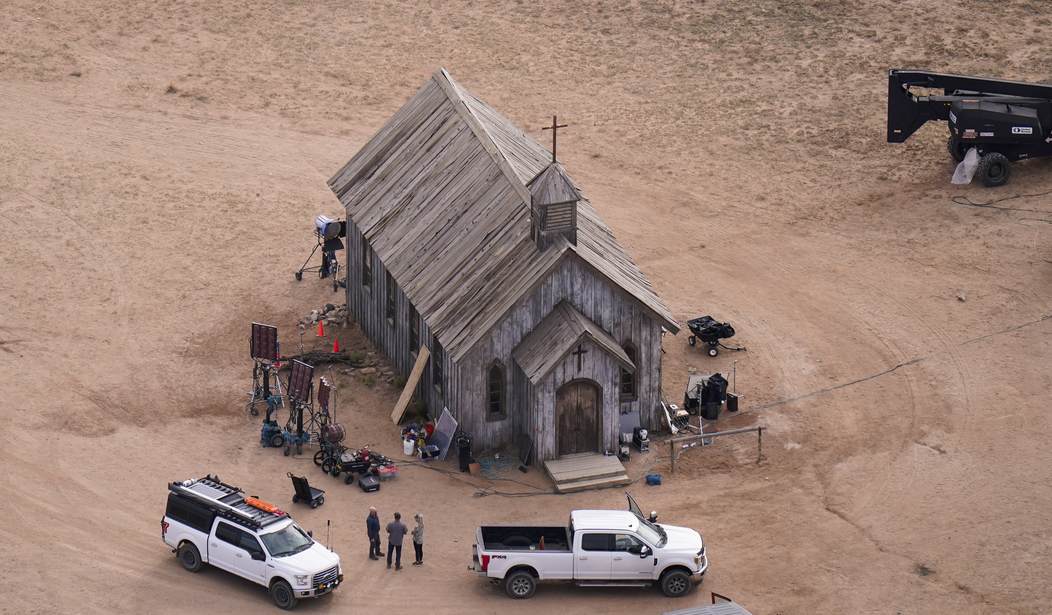When someone gets killed during a workplace accident there will pretty much inevitably be lawsuits that follow. That’s the case with the shooting of two people (and the death of one of them) by Alec Baldwin on the set of the now-shelved movie Rust. The latest lawsuit turned up yesterday, filed by attorneys for Mamie Mitchell, the script supervisor on the set. The information she reveals adds yet another twist to the already convoluted story of how live ammunition showed up on the set and how everything went so horribly wrong. It may also suggest a bit more culpability on Baldwin’s part if it turns out that any criminal charges are eventually filed as a result of the killing. (Associated Press)
A lawsuit filed Wednesday alleges that Alec Baldwin recklessly fired a gun when it wasn’t called for in the script when he shot and killed cinematographer Halyna Hutchins and injured director Joel Souza on the New Mexico set of the film “Rust.”
“There was nothing in the script about the gun being discharged by DEFENDANT BALDWIN or by any other person,” the lawsuit from script supervisor Mamie Mitchell says.
The lawsuit is the second to stem from the shooting, with many more expected.
I suppose the first question I would have regarding this lawsuit would involve what standing Mitchell has to bring the suit. Generally, in a case like this, the plaintiff would have to be able to show some sort of damages that would lead to the ability to seek restitution, right? According to the available details, Mitchell was indeed in the church when the shooting took place. She states that she was standing alongside the people who were shot, roughly four feet away from Baldwin when the gun fired.
That’s certainly close, and she claims that she was “stunned” when the shot was fired, but there is no suggestion that she was struck by shrapnel or injured in any way. What are her damages? I suppose she might claim mental distress and trauma, but her damages are going to be far less than those suffered by Halyna Hutchins and her surviving family members.
Perhaps more interesting are the new details of what precisely was going on during the filming when the shooting took place. Mitchell reveals that they were rehearsing for a scene that would involve filming “three tight shots of Baldwin.” One would be a close-up on his eyes. A second would focus on a bloodstain on his shoulder and the last one would be on his torso “as he pulled the gun from a holster.” That would be the infamous “cross-draw” that we’ve discussed here previously.
But the plaintiff goes on to say that nothing in her script called for Baldwin to point the gun in the direction of the camera crew and he was not scheduled to pull the trigger. So was he just screwing around? Or perhaps he was improvising and thought firing the weapon would make the scene more exciting? If Joel Souza (the director who was also injured) had decided on the fly to add a gunshot to the scene, that probably wouldn’t be too much out of the ordinary, but it seems like Mitchell would have mentioned that because it would have deflated her lawsuit quite a bit.
In addition to Baldwin, the lawsuit names assistant director David Halls (who handed Baldwin the revolver) and armorer Hannah Gutierrez Reed. I mention these three specifically because they were directly in the chain of custody of the firearm and responsible for making sure that it was “cold,” or safe. Investigators are still holding open the possibility of criminal charges in this case, and if it can be shown that there was no plan for the weapon to be pointed and the trigger pulled during that scene, does Baldwin’s culpability increase and the level of responsibility for the other people on the set go down?
It certainly seems that way. The total lack of firearms safety precautions on display that day is still outrageous, but if there was absolutely nobody expecting Baldwin to point the weapon and pull the trigger, I think the picture changes a bit. The assistant director would have felt less urgency to inspect the weapon thoroughly if it wasn’t scheduled to be aimed and fired, though he obviously still should have checked it. And obviously, Baldwin could then be on the hook for not even bothering to inspect it before making the lone decision to point it at the crew and pull the trigger.
That still doesn’t add up to a charge such as murder or homicide unless some new and seriously twisted information comes to light. But the idea of some form of reckless endangerment or even inadvertent manslaughter resting on Baldwin’s shoulders could come into play. I don’t know what Mitchell’s prospects for winning a settlement will wind up being, but the information she is providing could still end up being a major factor in the decisions that prosecutors make going forward.








Join the conversation as a VIP Member